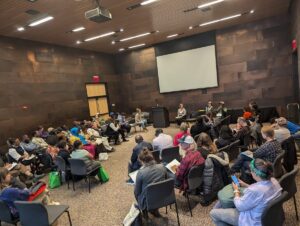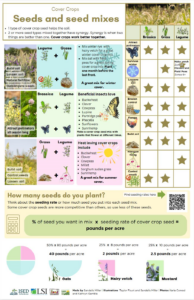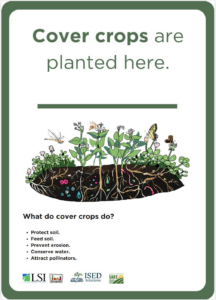Final report for LNC21-449
Project Information
- An explanation of the problem addressed and the solution pursued
Climate variability and land access issues make adoption of sustainable agriculture practices and multi-stakeholder collaboration increasingly important. This is especially true for refugee and immigrant (R&I) farmers who face barriers related to language and supportive networks. At the start of this project, LSI has successfully graduated seven farmers from its incubator program and had a new cohort of farmers ready to move onto their own land. It had established relationships with other regional farms for R&Is to serve as a forum for sharing culturally relevant training material, establishing peer farmer mentorship and addressing common issues among farms serving R&Is. With a proven path to success for farmers in its program, Global Greens (GG) implemented the “Communities of Practice and Farmer Led Training for Increased Sustainability of Refugee & Immigrant Farms in the North Central Region” program with the following objectives: 1) Offer continued learning opportunities for R&I farmers on sustainable practices, both virtually and in person, to increase long-term soil health and profitability. 2) Establish a Community of Practice among regional initiatives working with R&Is to enhance shared goals, find solutions to pressing issues and provide cross learning opportunities among regional farmers. 3) Incorporate mentorship between graduate and beginning farmers to improve adoption of sustainable practices that will prepare them for successful management of their own farm. The approach includes: Partnership with Iowa State University Extension and other research institutions to identify existing research on crop cover and simple water conservation techniques that can be replicated in-field and set up demonstrations on the training farm and graduate farmer plots for experiential learning. Regular in-field workshops or monthly visits to observe and discuss the work, and to record and discuss results. Events and handouts would be recorded or published to share with the wider networks. A field day event will be held to showcase the end of project results. The work would also result in increased availability of appropriate education materials and information sharing through a strengthened regional community of practice that meets regularly and encourages mentorship between graduate and beginning farmers through resources and tools. The project not only enhanced opportunities for LSI’s GG program and the next cohort of farmers, but also allowed for learning between the GG program, other regional programs, and participants in those programs to build environmental and economic sustainability.
2. The project's research approach (if conducted), educational approach and farmer learning outcomes.
Research and Education Approach: From the first year and annually, LSI consulted with experts at Rodale, Iowa State University, and Practical Farmers of Iowa to gather technical information and best practices used by small scale horticulture farmers in the Midwest. We used that information to distill what we would be able to do to set up field plots with farmers given language and cultural barriers. The best mix of cover crops and other soil practices was identified. From this it was determined that rather than separate demonstration plots, the program would also implement a“try and see” approach encouraging farmers to try out cover crops on their own plots, providing support with inputs, so they could learn the efficacy of cover crops to increase soil fertility in a short period of time, and then share and report to LSI and each other which ones worked best in which season and the results they observed on their crops and soil health.
In field meetings, discussions and workshops were held throughout the season to gather feedback and observe results together and adapt as needed. Training handouts and related materials for learning on cover crops from this were created and are shared with this report. These materials were developed and shared with the regional Community of Practice and shared with other farm programs as well (over 5).
Learning Outcomes: From the first year in the early spring and in subsequent years, LSI conducted classes with farmers on this initial information and project goals, and requested feedback on challenges on their operations and asked for feedback on the reasons they were not currently using cover crops. Answers were related to availability, lack of knowledge on which cover crops serve which functions, how to plant, and how to terminate. More advanced questions highlighted the issue that this grant was intended to solve--namely that farmers have small plots that they rent and they need to make money from and were not sure what the economic benefits would be from these practices. With that in mind, farmers also mentioned that they have had problems with germination and yield in areas they have used for more than 2 years and showed a willingness to try new practices to address this. This dialogue was important in building trust, identifying barriers and solutions, and establishing expectations for the project. That first year we intensively worked with 5 farmers to add cover crops into their planting plans. Through this, we found that farmers wanted “recipes” for cover crops that help them decide what they want with lots of details and instructions. This feedback and the technical information set the foundation for the two page sheet we developed called “cover crops on small plots” and small booklet and presentations we used in cover crop classes outside the season. We are now able to pull slides from these materials to use in our yearly “Organic 101” class. Throughout the project we found the 2 page sheet to be the most popular. The first year, we also identified that graduates may have more challenges implementing the practices, as over the 3 years of the project we have had the most farmers graduate than any other time due to new land partnerships. While this was great to scale their operations, farmer time was spent on securing farms and building infrastructure and they did not have as much time to share demonstrations with other farmers on their land. For this reason, we pivoted to focus more on incubator farmers implementing the demonstrations on their own plots at the incubator farm, rather than focusing on graduates and implemented “Cover Crop swap” in the fall, which offered additional land size to farmers that participated in the cover crop demonstrations. In this option, farmers can trade beds, or let their assigned plot fallow and be cover cropped, and are given another plot to use in the meantime that had cover crops on it already so they could realize the benefit more quickly, and then go back to their old plot once ready to see the difference. This allowed them to not lose any production space AND implement cover crops which was incredibly useful and impactful. In addition, with more graduate land sites identified, and farmers moving to these sites from the incubator site more frequently, it makes sense to have farmers start these practices and become accustomed to them to ensure they are carried forward to their first years on new and larger land.
3. Succinct statement of research conclusions
Though this project was education focused rather than research focused, the results of the outreach and education, is that farmers saw a significant impact as a result of adopting the cover crop practices, in particular, as many had farmed the same plot for several years, and so immediately so the increase in yields as a result of changing to the plot that had been covered plot, and then returning to the same plot they had cover cropped in the meantime. Introduction of water conservation methods at the incubator farm, such as drip tape, also resulted in adoption when farmers moved to larger land off site of 1 to 5 acres, as well as the desire to continue with the cover crop practices they had experimented with at the incubator. To date, 15 of the 29 farmers actively use more than one of the practices from this program and all 29 have adopted at least one and have begun to use these practices independently, including cover crop, drip tape and straw mulching, on their own going forward.
4. Farmer adoption actions that resulted from the education program.
One particular success was an advanced farmer at the Johnston site in the first year who made a cover crop and water management plan, procured supplies, and installed oats and peas in the early spring with great results. She described how she had the best year ever for pumpkins because of the spring cover crop she planted which improved the soil quality and germination. She shared that experience a few times in different teaching settings and farm tour groups to over 120 people. This success led to the adoption of cover crops from other incubator farmers in subsequent years.
We identified 5 more farmers as “Cover Crop Ambassadors” in the second year of the project at the Global Greens Incubator Farm and we spent more time meeting 1-1 with them about soil health goals. After an initial cover crop and soil health class in March (as done each year), these farm leaders have been instrumental in identifying and implementing best practices that work for small scale farmers. Other farmers at the incubator farm have observed, learned from and replicated these strategies. The introduced cover crops specifically included spring planting of oats and peas followed by crops like winter squash; mid-season plantings of buckwheat following a short spring crop and bookended by a late season planting of lettuce, radish, etc.; and a rye/vetch mix planted in the fall that comes back the next spring which we can strip till or fully terminate for transplants of tomatoes or eggplants. We continued to use the simple two-sided handout that shares these farmer-identified practices that are used at field days and in class. Through these three strategies we offer simple cover crops solutions to small scale market farmers that help them make money and improve soil. That practice serves them well on a small scale and they will NEED to do it for soil health on a larger scale. When we initially started the project, we felt that the small-scale farmers on the incubator farm would be less likely to adopt the practices than graduates farming on a larger scale, as it would be harder to see the benefits and adopt them. However, we are pleased to see that with more focus on the incubator farmers, they were willing to implement cover crops on their smaller plots and they saw soil health benefits. These 5 farmers have become instrumental in co-teaching field days, farm tours, and external presentations. As a result of seeing the impact on the early adopters, all incubator farmers have requested to plant cover crops.
As a result, in the last year of this project saw 15 of the 29 farmer families implementing cover crops and water management practices on their own, an increase from 3 out of 29 at the beginning. Three incubator farmers requested and received hands on help in their ¼ acre plots to set up drip tape in May. Now all 15 farmer graduates are using drip tape and we help them get drip tape and cover crop supplies in bulk. All of these 29 farmers also showed an increased interest in straw mulching, and 15 of them have already implemented a soil health and water conservation strategy together.
Two incubator farmers graduated onto 3 acre plots at a new community farm in Granger, Iowa. Partnered with Practical Farmers of Iowa, and they both requested and received help for cover crop planting and water management. They both took the time their first year on the plots to develop drip tape watering plans as well. They demonstrated their practices at the 2024 field day.
July 21st 2024 was our Cover Crops Field Day at the incubator farm. 2 farmers who had used cover crops in their ¼ acre plots spoke to the attendees about their soil health before and after the cover crops. They also spoke to how and when they were doing the cover crop around their cash crops. Farm Manager Jennie also spoke about how she uses cover crops to hold fallow plots and rest them in between cash crops and how she uses them to fight invasive weeds like Canadian Thistle.
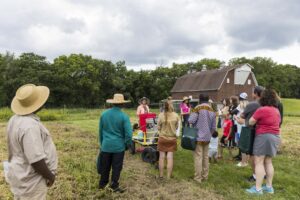
July 22nd 2024 was a day for incubator farmers to explore the new graduate farm site in Granger, and learn from those recent graduates how the transition was going and what skills they were needing most in the first year off incubator.
Story:
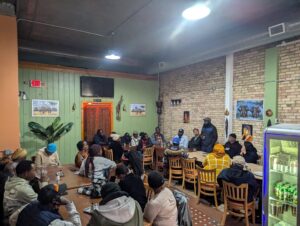
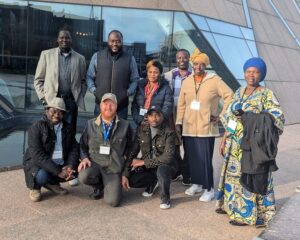
Objective 1. Farmer led training on sustainability to improve land for on-going profitability with the goal of 30 farmers using practices that increase production and demonstrate increased knowledge of sustainability practices for greater production.
This was achieved in that 15 Global Greens farmers implemented the all the demonstrated practices and 29 had implemented at least one and had plans to use mulch and several other of the practices in the next season. 32 Global Greens farmers were introduced to cover crops, attended workshops and in field sessions and learned practically about their use and benefits.
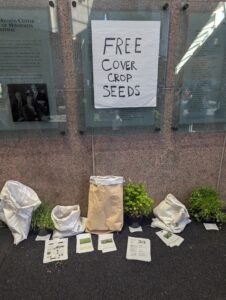
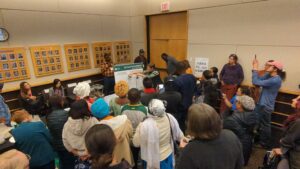
Objective 2. Regional community of practice (COP) that connects R&I farms and farmers including a COP with 5 R&I farms established that increases resources and peer networks among farmers. As a result, resources are shared to strengthen programs that serve R&Is and improve farmer connectivity.
This was achieved in that more than 5 R&I farm programs are strengthened by having access to the resources and practical demonstrations on their use, and 3 R&I regional organizations regularly attended meetings and worked together to create and share materials and address issues facing farmers in the region. By the end of the project, the 3 core COP partners and 5 or more partners in the region are taking part and benefiting from content and other resources and best practices shared by the core COP members.
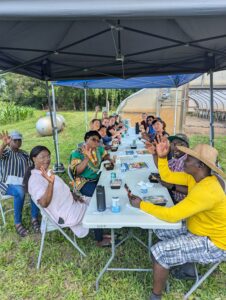
Objective 3. Peer mentorship to accelerate sustainability so that 30 farmers utilize learning from peers resulting in greater achievement of farm goals and increase knowledge of practices listed in their goals.
This objective was achieved in that 30 farmers utilize the learning from peers and program leaders to achieve their farm goals and increase knowledge on the sustainability practices listed in their goals, mostly related to water management and soil health and cover crops.
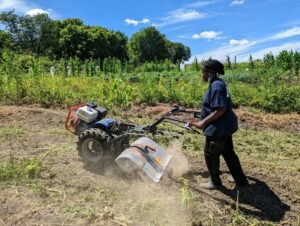
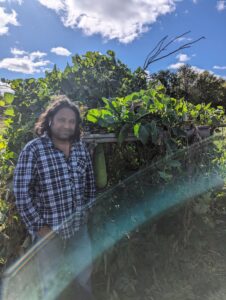
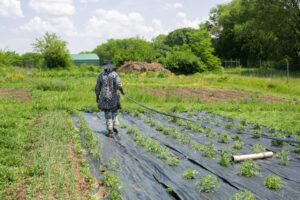
The primary activities of this project are to conduct annual cover crop and water conservation demonstrations with farmers as mentors and develop a regional community of practice made up of other farm programs to develop a regional network for refugee & immigrant farmers that come through Lutheran Services of Iowa Refugee & Immigrant Services' Global Greens program. This was accomplished through peer mentoring, a regional community of practice and training on sustainable agriculture with development of virtual training co-led by graduate farmers. The beneficiaries are refugees and immigrants from multiple countries. The program will enhance education and service delivery to similar programs participants.
Here is a report of our results against project objectives, outcomes and activities over the entire project.
Objective 1. Farmer led training on sustainability to improve land for on-going profitability with the goal of 30 farmers using practices that increase production and demonstrate increased knowledge of sustainability practices for greater production.
Final Activities and Results:
By the end of the project, over 15 farm families were implementing both a soil/cover crop and water management practice of this project, and 29 farmers were adopting practices and demonstrated increase knowledge. As mentioned above, LSI coordinated with partners to plan the annual cover crop education strategy and cover crop demonstration and education began in March and ended in October year season. LSI purchased most of the cover crop seed from local producer, Iowa Cover Crop. There were typically 2 demonstrations each year, one started in March and terminated in June and another started in July and terminated in October to showcase different varieties and results in different seasons. Farmers were provided cover crop orientation early in the season and given cover crops seeds for the spring planting that included oats and peas followed by crops like winter squash, mid-season planting of buckwheat and clover following a short spring crop and then followed by a late season planting of lettuce, radish, etc.; and a rye/vetch mix planted in the fall that comes back the next year which we can strip till or follow with transplants of tomatoes or eggplants. These three strategies offered simple cover crops solutions to farmers with results that were practically observable and will be continued when they move to larger lands. When we initially started the project, we felt that the small-scale farmers on the incubator farm would be less likely to adopt the practices than graduates farming on a larger scale, as it would be harder to see the benefits and adopt them. However, farmers at the incubator observed a dramatic increase in production and less loss of soil from runoff in the rainy periods due to use of these practices in the last two seasons. Now all farmers that have observed the results the last two seasons are requesting cover crop seeds and continue to implement these practices. Graduate farmers were primarily very busy preparing their land as many had recently graduated due to identification of viable land sites outside of Global Greens. However, cover crop starter kits were offered to graduate farmers and over 5 graduate farming families decided to implement it with more requesting it in the coming season. The cover crop kits included 40 pounds of seed and a trash bin, as well as being lent a spreader and given the Johnny's seed cover crop comparison chart and provision of an orientation on the chart. The main areas that farmers expressed that they observed and were very happy with related to cover crops was the significant yield increase even on the small land size and that the soil and plant quality was much better. Specifically, they had less soil runoff. They also noticed that the cover crops kept the weeds down and required less labor when preparing their land. Farmers that observed these changes and heard about it from their neighbors at the training farm all have started or plan to start the same. LSI also implemented a cover crop demonstration on the farm which started with tarping an empty tract of land to remove the thistle, which is a very big issue at the training farm. At the end of the summer, when LSI staff, volunteers and farmers removed the tarp together, all were very interested in how the heat under the tarp had destroyed all the thistle naturally. This plot is now planted with cover crops before a new farm or farmers or provided with this land to farm. LSI also conducted one demonstration with cover crops in a community garden space that was not being used. Buckwheat was planted in this plot and gardeners who are aspiring farmers, also observed how it kept weeds down and the land and soil healthy. A new gardening family will also benefit from the soil health of this plot when it is used for production again. Farmers realize through observation and using cover crops that they also do more for their land than fertilizers. There is now demand among all farmers for cover crops, where there was no interest before. New farmers to the training farm may still need to be convinced and on-going practical demonstrations will be very useful. Some on-going questions is how to help farmers continue to budget to buy their own cover crop seed in the coming years. Besides the 29 farmers that have learned about and realized the benefits of utilizing cover crops, 32 farmers have been trained on cover crops and 161 underserved farmers from the LSI Global Greens program and other programs came on a farm visit or received knowledge/education on cover crops.
Objective 2. Regional community of practice (COP) that connects R&I farms and farmers including a COP with 5 R&I farms established that increases resources and peer networks among farmers. As a result, resources are shared to strengthen programs that serve R&Is and improve farmer connectivity.
Activities and Results over the project:
In Year 1 the project identified partners and met quarterly, starting by creating a “charter” for the group based upon shared desires and strength. We identified the desire of our program staff and farmers to meet more often and see each others’ farms. Cultivate KC and LSI ended up attending all meetings and were able to keep consistent communication even as other core groups had turnover with staff who participated in the COP. The Community Crops in Lincoln, Nebraska and Matthew 25 in Northeast Iowa were 2 other core group members. These conversations in year 1 culminated in Sept. 2022 with a large gathering at GG incubator farm of 108 people- 45 of which were historically disadvantaged farmers from regional programs.
The strength and support our regional groups have had with each other over the course of this project has been inspiring and beneficial. Despite challenges and a few missed quarterly meetings, the convenings and gatherings with partners and farmers we had in person and virtually directly led to an improvement in regional and local connections between COP partner staff and Program farmers/participants. Besides, the core group of the 3 regional COP members, many new programs started and expanded here in Iowa, including in Earlham, Waterloo, Cedar Rapids, and Iowa City, Iowa, that LSI consulted with on a regular basis to help start up their incubator farm operations and also provided joint education outside of quarterly meetings. We also support, connect, and contribute to a wide range of partners at the city level – from the 240 garden families at 20 partner garden sites we connect to land around Des Moines, to Iowa Food System Coalition, and work with the City of Des Moines’ ADAPT DSM climate plan.
Quarterly meetings and other outreach activities directly improved programming as we explored themes of challenges like land and market access and jointly discussed regionally similar solutions related to barriers of entry to farming. The shared work (especially of) Cultivate KC, our primary COP partner, and LSI Global Greens in other SARE, BFRDP, and 2501 projects to create educational materials enhanced what we have to offer each other for program and farmer educational resources and informed (and will continue to inform) how we support newer programs and a wider range of farmers who are not currently in our network.
Though the SARE NC regional COP for educational farm programs across the region will not have ongoing funding specifically from this project, it will continue in various forms like peer to peer visits (one farmer peer visit planned for summer of 2025 in Kansas City), annual visits to Emerging Farmer Conference in MN where program staff and farmers can re-convene, on a national level through FIELD School and in ISED BFRDP ET grant focused on training trainers in incubator farm programs, in Iowa through two Land Market Capital grants with Iowa Valley RC&D and Sustainable Iowa Land Trust (LSI is subgrantee), and in our own local cities. LSI and other programs and farmers found great value in convening and visiting the other regional COP members. We hope to continue COP activities regionally and locally in order to catalyze best practices in Sustainable Agriculture Research and Education. Another way this effort is becoming sustainable beyond the project is that the FIELD School, a larger national incubator farm COP directed by Jennifer Hashley is beginning to offer monthly networking calls on specific topics relevant to incubator farms. LSI presented work on Group Land Access at this national group as well as on other topics. We continue to join these calls, even after the SARE project ended, and have smaller regional meetings. Overall, relationships with other regional and local partners has strengthened as a result of this work.
Some of the materials worked on by the COP are shown below, though not all were created specifically for this project, the convening of the COP that this project supported, assisted in ensuring that the team worked together to come up with the relevant materials for the region, shown below, and which were shared with the newer farm programs. For now these are shared in the below folders while a web based platform is in the final stages of being developed through a partnership with ISED Solutions/Tufts.
https://isedsolutionsvault.app.box.com/s/s2y9jllbr1nwkgvw8olqtqi0rfx6bg3i
https://isedsolutionsvault.app.box.com/s/yqusyb9ajtfywg7mhlfjeani9k2kbh0o/folder/298785899245
https://isedsolutionsvault.app.box.com/s/6vsbr0v8c3oilbni8djdb9ym138gkk5l
We were able to reconnect in October of 2023 with staff from Minnesota, NE, KC, and Illinois at the Field School Conference in Kansas City. At this conference, LSI presented findings from our SARE grant related to Cover Crop and Water management to 15 incubator program staff from around the country. The presentation was designed to be participatory and we had robust discussion on best practices.
At the conference, we convened to make plans for connecting in person with farmers since this is what we identified as the largest value of this group is. COP meetings held in spring and early summer were focused on details of the field day that we held July 21 and 22 on our new 13 acre community farm. Meetings focused on ensuring proper hospitality for farmers and farm program staff, identifying the desired learning need of farmers from their programs, and to make sure as many core group members could attend.
A few other highlights of the work include:
- LSI presented finding from our Cover Crop and Water Management work to peers at the Great Plains Conference in St Jospeh, MO. This was a similar presentation of cover crops on small plots that also incorporated sharing of best practices of pedagogy and participatory education in January 2024.
- On July 21, 2022 GG Field Days 85 attendees, COP member attendance from Lincoln, NE, Kansas City, MO, Waterloo, IA and Black Hawk County Garden and INcubator Farm, Center For Rural Affairs, Practical Farmers of Iowa, Sustainable Iowa Land Trust, In Harmony Farms, Iowa City Compassion, Iowa Valley RCD, NRCS, FSA, Iowa State University.
- LSI had in person cross visits from 7 programs in the region during the year including members of the COP and from Omaha Nebraska and Waterloo, Iowa to provide a tour and share best practices as well as meet and talk to farmers. These groups brought farmers with them to learn and interact with other farmers. Altogether 30 historically disadvantaged farmers visited the Global Greens farm from other incubator training programs in the year.
Objective 3. Peer mentorship to accelerate sustainability so that 30 farmers utilize learning from peers resulting in greater achievement of farm goals and increase knowledge of practices listed in their goals.
Activities and Results through the end of the Project:
By the end, advanced and graduate farmers provide at least 2 trainings or consultations per year to help beginning farmers achieve their goals, inclusive of over 30 farmers. Specific to the practices this program promoted, 15 farmers at the Global Greens training or incubator farm lead the demonstrations on cover crops and 5 off-site graduate farmers also received seed and were helped to plant seed to grow and promote practices. These farmers frequently interacted and shared the practices in the field with their neighbors at the incubator farm or at their graduate sites, such as In Harmony Farm. The practical viewing and observation of the results has been the most powerful part of the program and has resulted in all current farmers at the training farm desiring to continue these practices, as well as those that have graduated.
We identified 5 of the advanced farmers as “Cover Crop Ambassadors” at Global Greens Incubator Farm that we spend more time meeting 1-1 than other farmers. After an initial cover crop and soil health class each March, these farm leaders have been instrumental in identifying and implementing best practices that work for small scale farmers which other farmers at the farm can observe, learn from and replicate, including cover crops, as mentioned above. These farmers were available to teach at field days and are all continuing implementing cover crops at Global Greens farm on ¼ acre plots.
LSI also supported the Burundians Iowans Association (BIA) whose members include the 5 GG graduate farmers that moved to In Harmony to obtain a grant for a tractor they will purchase to manage their land for the 2023 season. The purpose of the tractor is for their own use as well as to share with other farmers and teach and mentor on its use as a community project. BIA supported more than 10 individuals to learn more about farming , including make supply orders, and others with equipment they have. These supplies and equipment include items needed for cover crop demonstrations and implementation.
Through the first two seasons of the project we have seen that advanced farmer, even at the training farm on smaller plots, have observed and realized dramatic benefits of using cover crops, including soil health and significantly increased production levels that were visibly observable and translated to increased produce to market. The advanced and graduate farmers shared these their results with others, and the other farmers on the farm observing and learning from farmers as they implemented the crops, now all have elected to adopt the same. The goal now is to facilitate the adoption for farmers that recently joined the training farm last season and will join this season. Farmer sharing and coaching was the greatest catalyst to other farmers adopting the practices of this project.
The end result of graduate farmers setting up on new land and helping other farmers that had graduated from the training farm and were in their first year was that all successfully transitioned their farmers and had a good market season, and sales and revenue increased each year. The leap of going from 1/2 acres to 1 and most cases 2-3 acres, was not an easy one for the newly graduated farmers.
More specifically, Global Greens hosted a Field day at Global Greens Farm on September 25, 2022, in partnership with Practical Farmers of Iowa and the USDA Natural Resource Conservation Service (NRCS). The field day was focused on cover crops and growing culturally relevant crops. Two farm businesses that participated in the incubator program gave tours of their farms and shared their experiences of learning about cover crops that work well in Iowa. Jennie Erwin, the Farm Management Specialist at Global Greens, also shared about how cover crops are integrated into the land management plan at the Global Greens incubator farm. The Natural Resource Conservation Service brought their soil health truck and gave all attendees a soil demonstration. 108 people attended the event. Attendees included beginning farmers, aspiring farmers and the general public. We also hosted several other tours to mixed groups of farmers and agricultural professionals on the farm who were interested in a wide range of topics. GG farmers taught peers about drip tape, mulch, and cover crops. GG staff taught agricultural/program professionals about running an incubator farm. LSI had similar events in each year of the project where advanced farmers presented about their successes with cover crops on the training farm and graduates shared about their successes on larger sites for newer farmers and offered their assistance outside of the field days.
New farmers learn from graduate farmers everything from production to best record keeping practices, and practical farm operations tips. Graduates and advanced farmers also often volunteer their time to support a newer farmer in obtaining supplies or other inputs they need when they are just starting out and are not able or aware of how to procure them.
Farmer Esta shared about cover crops and how she uses small scale equipment like the BCS handheld mower and tiller to manage her ¼ acre farm on at one graduate farm tour. GG staff members Jennie and Zac shared how to use the equipment needed to evenly spread the cover crop seeds, shared the handout with 3 different easy seasonal cover crops that small scale producers can use.
Farmers had a chance in both Valley and Granger to learn three basic cover crop seeds and try the seeding equipment. In Granger, attendees planted a Rye Cover Crop in a fallow area in Esta’s new farm.
In July of 2024 LSI held a field day at the newly rented 13 acre farm in Granger, IA a collaboration between Practical Farmers of Iowa and LSI for graduate farmers, where farmers shared best practices on sustainable agriculture with other Global Greens farmers and farmers from across the region that visited with members of the Community of Practice and a farmer named shared how she uses buckwheat to attract pollinators and suppress weeds before her fall planted crops.
In addition in October of 2024 at the Fall Harvest Party at Valley Community Center, where the incubator farm is located many aspiring farmers that are now in garden plots attended the farm tour and learned about compost, cover crops, and drip tape from Global Greens Farmers.
Additional outputs included:
A written report or case study on the lessons learned and best practices developed through work of this grant and demonstrations.
LSI created a new comprehensive toolkit for farmers and farmer orientation which we hope can become the standard for incubator farms. We combine years of experiential education with curriculum development and current University information, with learning and teaching best practices. The program toolkit touches on all aspects of sustainable production, from markets and finances, to soft “life” skills, and farm management and conservation- laying out different levels and classes that a Global Greens farmer is supported to set goals on as they go through our program. LSI Global Greens used general collaboration standards and best practices found through our co-working on resource development to create this material, and many of the hundreds of other materials created with our regional and national partners help support farmers on their journeys to farming success. In practice, LSI Global Greens couples this guide with assistance from staff to help them navigate the program internally and find resources externally that they can connect to even after graduation.
SARE has been an important part in being able to develop this guide, and we did our best to incorporate the latest conservation production information, so that farmers can make more money in economically sustainable careers, while also improving our communities and society with healthier food and more beautifully diverse farms.
Members of at least 5 peer organizations and 8 LSI GG farmers attended the 2023 Emerging Farmers Conference.
The first year of this project, the Emerging Farmers Conference was held virtually due to the ongoing impact of the COVID pandemic. In 2023, LS attended the Emerging Farmers Conference with over 8 Global Greens farmers and two staff members of partner organization Iowa Valley RC&D. This year we had a table for the first time where we shared resources created through the project which were of interest to many farmers. LSI's multilingual staff joined, Firmin Ntakimazi, who was also able to help interpret the conference in the languages that the majority of farmers speak.
In the late fall of 2024, LSI attended the Emerging Farmers Conference again with several farmers. Though peer organizations attended both years, the organizations opted to attend on their own and meet at the conference. LSI Global Greens farmer Esta Minani co-presented during the Soil Health and Cover Crops workshop to over 50 farmers on cover crops and on her success on her new farm. We helped curate this session and brought in Stephanie McClain from NRCS in Minnesota, Adria from University of Minnesota, and Tiffany LaShae from Soul Fire Farm. We had found that GG farmers really liked the demonstration that Mike Henderson from NRCS had completed on soil health and cover crops in the table top demonstration. Also, farmers learned a slump method to determine soil health from a professor at the University of MN.
During the 2024 Emerging Farmers Conference, LSI staff and farmers also took advantage of the opportunity to visit other organizations and farms in the area. The farmers with staff attended an AGAPA- African Grower and Producer Alliance meeting at a local MN restaurant. LSI helped to cover part of the cost of the meal. Each of the 32 farmers at the event shared their own farm journey, how important the land is to their family to be able to grow healthy foods, to reconnect with heritage and pass it along to their kids. There are a few groups who have had success in getting land, like a farmer named Moses (chair of AGAPA and Director of Kilimo Incubator Farm in Cambridge, MN) and the Providence Farm Collective who shared their success in securing land they own. The lessons gained in this session are invaluable because they have been able to get land and shared reinforcing anecdotes on practices we teach related to sustainable soil health, accurate record keeping, and diverse markets. We really want to host or find ways to sponsor peer groups like these who echo the classroom trainings and combine them with practical application and successful outcomes into the future and these relationships with continue and be built upon.
Cooperators
- - Technical Advisor
- - Technical Advisor
- - Technical Advisor
Research
Education
32 farmers (29 farm families) enrolled in Global Greens were exposed to knowledge on cover crops, soil health, and water conservation through in field, classroom, and 1-1 technical assistance.
Our approach is to use experiential education that puts resources in the hands of farmers to try new conservation techniques. Classroom, 1-1 technical assistance, group in-field training. Namely, we train farmers in the class while hearing their concerns and modifying our information to fit those needs, follow up with 1-1 planning sessions for resource access and crop planning, then implement in field with 100% of our farmer “cover crop ambassadors”. We also make seed available to the other 10 GG farmer families and 15 graduates for free. Before our field days, we prepared with those 5 farmers ambassadors to discuss some important talking points regarding their cover crop plantings and use of drip tape. In the past, we did not train the ambassadors or pay them and had less luck at getting farmers to implement practices. It is the “farmer telling the farmer "Which has the highest level of trust. It allows them space to try new practices risk free which allows them to implement practical and tested practices (suggested by advisors) but now the farmers are the experts. Associate handouts we created are Cover Crops on Small Plots which will be shared by end of project.
Except from the GG Dirt Newsletter oct 27 2022
Cover crops on small plot handout
Organic Refresher during orientation (30 minutes)
*General Philosophy
-health
-customer demand
-higher price
-farmer experience matches this
*Major Practices
-Soil Fertility and Nutrient Management- weed control
-Soil and Water Conservation
-Crop Rotation and Cover Crops- soil building, nutrient catching, erosion preventing, weed suppressing
-Pest control using systems over products- maintain beneficials use row cover vs. sprays
-Maintain wildlife habitat and biodiversity- snakes, birds, beneficial insects
-No prohibited synthetic products- talk about seeds
-Detailed Record Keeping
*Other
-Emphasize systems over products- show OMRI label and USDA Organic label many times.
-Seeds- must use organic variety if available. Conventional ok if you have tried hard to find it at several other places. NO GMOs
-Buffers
-We are only CNG, not Certified Organic. We are not allowed to advertise as “Organic”
*Short Quiz to test knowledge
- Difference between conventional and organic farming
- 3 Examples of Organic farming
- 3 benefits of cover crops
- Name 1 cover crop that adds nitrogen
- Name 3 pest management practices
- Name 2 ways to increase pollinators in your garden area
- Name 3 ways to organically manage weeds
- One organic practice you will use this year
Other Handouts and Activities created:
Savanna Institute Global Greens Presentation - Copy
PFI 2023 LSI Global GreenspresentationFinal - Copy
Orientation Materials 2024 (4) (1)
Cover Crops + Beneficial Insects_Pamphlet
2024_PFI_Conference_Global_Greens_Traditional and Diversified Veggie_kc_edit.pptx(3)
2024 Emerging Farmers - Soil Health on rented land
Project Activities
Educational & Outreach Activities
In field workshops and practical demonstrations
In field tracking program progress
Participation Summary:
Global Greens hosted a Field Day at Global Greens Farm on September 25, 2022, in partnership with Practical Farmers of Iowa and the USDA Natural Resource Conservation Service (NRCS). The field day was focused on cover crops and growing culturally relevant crops. Two farm businesses that participate in the incubator program gave tours of their farms and shared their experiences of learning about cover crops that work well in Iowa. Jennie Erwin, the Farm Management Specialist at Global Greens, also shared about how cover crops are integrated into the land management plan at the Global Greens incubator farm. The Natural Resource Conservation Service brought their soil health truck and gave all attendees a soil demonstration. 108 people attended the event. Attendees included beginning farmers, aspiring farmers and the general public. We also hosted several other tours to mixed groups of farmers and agricultural professionals on the farm who were interested in a wide range of topics. GG farmers taught peers about drip tape, mulch, and cover crops. GG staff taught ag/program professionals about running an incubator farm.
In addition LSI held field days in July 21 and 22, 2024, details are shared in the activities section. This included 85 attendees including Community of Practice members.
Objective 2: Regional community of practice (COP) that connects R&I farms and farmers.
LSI set a group charter with the members and ensured their agreement in the COP as formal members. The members of the regional COP at the beginning were: Big River Farms in Minnesota, Community Crops in Lincoln Nebraska, New Roots for Refugees in Kansas City and Matthew 25 in Cedar Rapids. Big River Farms had staffing changes that did not allow for continuing in the formal COP group but we continue to work closely with them and share resources as they also host the Emerging Farmers Conference. The farm organizations have set protocols for sharing of project best practices and learning materials, links were provided in the main part of this report. The group met four times in the first year and continued to meet and plan activities in the following two years, including numerous cross visits to each others farm programs as well as ongoing review and creation of materials. LSI had in person cross visits from 7 programs in the region during the first year alone including members of the COP and from Omaha Nebraska and Waterloo, Iowa to provide a tour and share best practices as well as meet and talk to farmers. These continued in years 2 and 3. These groups brought farmers with them to learn and interact with other farmers. Altogether over 50 historically disadvantaged farmers visited the Global Greens farm from other incubator training programs over the project period, or LSI and farmers visited and presented to the farmers at events such as the Emerging Farmers Conference.
Objective 3: Peer mentorship to accelerate sustainability.
Activities related to this are described in detail in the other sections of this report and in Project Activities section.
Education and Outreach Activities
Consultation activities listed were generally to order, distribute and install supplies, education materials consisted of one handout, one class and one video on conservation topics. These activities are described in detail in other sections of this report and in the Project Activities section. One published article was in LSI's The Dirt newsletter on the importance of cover crops on October 27, 2022. The education activities included organic 101 class that focused on water conservation and soil health, visits from the NRCS soil truck which came to the LSI GG hosted PFI field day to show no till and a cover crop demonstration and numerous other field days, conferences and in field and classroom workshops listed in the educational activities seciton.
We hosted several tours from new programs or aspiring programs. These included farmer to farmer introductions and a focus on cover crops and drip tape as well as advice and best practices conversations on an agricultural professional/program level. The PFI field day was extremely successful being able to bring 108 attendees from a diverse range of groups and knowledge levels to hear about using cover crops and cultural vegetables. The NRCS presented to all 108 attendees with their soil truck comparing soil from tilled, no tilled, and cover cropped soil as well as the field days in September 2022 and July 2024 with regional Community of Practice members attending along with some of the farmers they work with.
Activities include consulting with farmers to locate and source drip tape materials, straw mulch, appropriate cover crop seed needed for their farms and season plans, assisting farmers to install these, and working alongside them to know how to use the earthway broadcast seeder or other scale-appropriate cover crop installation methods, accessing equipment for install and termination.
Other activities include ones done informally by farmers who installed cover crops. The farmers who were given free cover crops, consultation when to plant these, and help to install the cover crops at the incubator. At time they needed no help with a good plan and were the best at explaining informally to other farmers “the soil I have here for my pumpkins is the best I’ve had it where I had an oat and peas cover crop.” We attempt to capture this knowledge transfer in mid-season and end of season meetings but it is very challenging to find a way to quantify # of farmers who shared info, # of farmers who benefitted, # of farmers who changed a practice. Regardless we see this organic sharing of knowledge as one of the greatest benefits to farmers of different levels farming at the incubator site.
See full list of classes and activities in the education section of the report.
Learning Outcomes
- Organics Basics
- Cover Crop Benefits
- Water Conservation/Management: General
- Water Conservation/Management: Use of Drip Tape
- Use of Straw Mulch
- Water Conservation/Management: How to fix water leaks, water efficiency
- Cover Crops: Install oats and peas before squash or midsummer crop
- Cover Crops: Install buckwheat between spring and fall successions
- Cover Crops: Install rye and hairy vetch interseeded with eggplants or after removal from field
- Cover Crops: Use of Earthway broadcast seeder
- Cover Crops: Use pull behind broadcast seeder
Project Outcomes
Use of Cover Crops
Improved water conservation practices
2024: Esta Minani was a farmer who had been at the incubator for almost 10 years and had chronic problems with soil fertility and misuse of water and other resources. Though she attended many of our classes, she also didn’t keep any income records because she didn’t see the value of it AND because of her own literacy and personal barriers.
She kept saying that she needed to make money and didn’t have room for cover crops and didn’t want to do drip tape or mulching because they “cost more money.” However, throughout the course of this project she received 1-1 planning, classroom training, and in-field assistance to get cover crop materials and drip tape materials to try out. Due to the work of this project, she began keeping records, using water management practices like straw mulching and drip tape. Not only did she use the practices but she became a staunch advocate with other farmers in the region and became our lead “cover crop ambassador.” Because of her hard work to overcome those barriers and try new things, and due to her success at market, she was able to complete her business plan and was promoted to a 3 acre opportunity at the new LSI/PFI Community farm in Granger. She has now purchased a new tiller and plans to buy a bigger tractor next year.
She is now a success story of someone who overcame barriers of small plots and short term economics to now see the value of investing in sustainable production materials. Her soil is healthier (even in a short period of time) AND she now pays for her own water and sees how much money she can save when using smart water conservation practices. She was the key LSI farmer presenter during our co-presentation on “Soil Health on Rented Plots” at the Emerging Farmer Conference in November 2024 when we requested the extension to present at that conference. During the 2024 Field Days, she showed off her ¼ farm in the incubator farm in West Des Moines to 85 farmers and shared her new 3 acre farm in Granger at the PFI partner site and helped lead demonstrations with 55 other farmers on planting rye and vetch using an earthway seeder. Due to confidentiality we cannot disclose some personal details of what she went through to be able to achieve this, but it cannot be stated how impressive and resilient she is. She has gone through a lot as a refugee and as a woman in a new country leading her family in order to make herself a more economically and environmentally sustainable farmer.
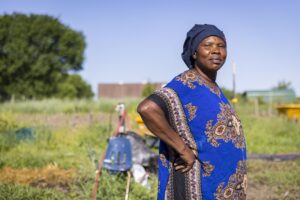
In the 2023 season LSI developed incubator farm cover crop ambassadors who practical demonstrated results resulting in all current incubator farmers implementing or planning to implement cover crops and 2 graduate farming families adopting (4 graduate farmers) with others planning this for next season.
The farmers who were our “cover crop ambassadors” shared that they really love being part of efforts to share their conservation practices with so many people. There were people coming to our farm who included over 160 historically underserved farmers, but many other hundreds of people are being reached by the tenacity and dedication of GG farmers. Though these people may not have farms to implement cover crops on, they are often market consumers and supporters of a wider movement to make sustainable agriculture mainstream. Because of the farm's location in a suburban area and the participation of the farmers, we can provide hands-on demonstration and a visible use of sustainable practices to a wide audience.
In 2022 season, we worked with Big Muddy, CFRA, 2 ECBOs from Nebraska, 3 Waterloo groups collaborating to start a new incubator, Iowa City Compassion, In Harmony Farm, etc.) they will all be invited to the 2023 COP meetings.
See notes above under Objective 1 about woman farmer and her success with her cover crop experiment that resulted in an excellent pumpkin harvest that she shared with other Global Greens farmers on the extra land in Johnston that we were able to use this year.
A lot of money and resources goes to research and university level projects, however, this information may not be easily accessible to the every day farmer. There are many people in these urban spaces looking to garden and interested in sustainable agriculture but don’t know where to start. Therefore, more work needs to be done to make sure there are resources available for helping urban farmers navigate information that meets them where they are at, that is applicable, relevant, and easily understood. LSI appreciates the educational aspect of the SARE program to bring the research to the community. This work is sustainable as it teaches practical skills related to soil and water conservation and real-life results that benefit farmers that they will carry with them into the future. Because the work is built into a farmer mentor model, mentors build or enhance skills that allow them to continue to support newer farmers into the future. We anticipate continuing relationships with entities such as USDA NRCS and other partners to continue educations and visits that are free of charge to farmers at to LSI. Global Greens field days and the first Field Day with PFI will continue in the future and always have great participation from farmers, community members and supporters. Collaborations such with ISU and PFI have been strengthened for future engagements as well as with the Rodale Institute. The ability of BIA to obtain a tractor and other assets will help the communities of socially disadvantaged farmers they support well into the future.
